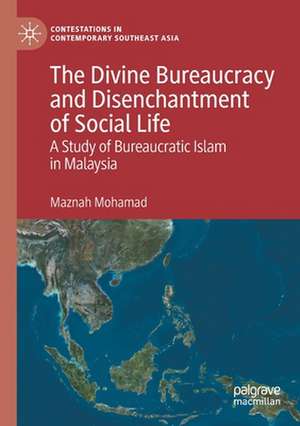The Divine Bureaucracy and Disenchantment of Social Life: A Study of Bureaucratic Islam in Malaysia: Contestations in Contemporary Southeast Asia
Autor Maznah Mohamaden Limba Engleză Paperback – 3 mar 2021
| Toate formatele și edițiile | Preț | Express |
|---|---|---|
| Paperback (1) | 691.70 lei 43-57 zile | |
| Springer Nature Singapore – 3 mar 2021 | 691.70 lei 43-57 zile | |
| Hardback (1) | 697.05 lei 43-57 zile | |
| Springer Nature Singapore – 3 mar 2020 | 697.05 lei 43-57 zile |
Preț: 691.70 lei
Preț vechi: 813.76 lei
-15% Nou
Puncte Express: 1038
Preț estimativ în valută:
132.47€ • 136.49$ • 110.97£
132.47€ • 136.49$ • 110.97£
Carte tipărită la comandă
Livrare economică 24 februarie-10 martie
Preluare comenzi: 021 569.72.76
Specificații
ISBN-13: 9789811520952
ISBN-10: 981152095X
Pagini: 320
Ilustrații: XXIV, 320 p.
Dimensiuni: 148 x 210 mm
Greutate: 0.42 kg
Ediția:1st ed. 2020
Editura: Springer Nature Singapore
Colecția Palgrave Macmillan
Seria Contestations in Contemporary Southeast Asia
Locul publicării:Singapore, Singapore
ISBN-10: 981152095X
Pagini: 320
Ilustrații: XXIV, 320 p.
Dimensiuni: 148 x 210 mm
Greutate: 0.42 kg
Ediția:1st ed. 2020
Editura: Springer Nature Singapore
Colecția Palgrave Macmillan
Seria Contestations in Contemporary Southeast Asia
Locul publicării:Singapore, Singapore
Cuprins
1. Bureaucratisation and Disenchantment.- 2. Origins of the Divine Bureaucracy.- 3. Features of the Divine Bureaucracy.- 4. Standardising Faith.- 5. Ring-Fencing Constituents.- 6. Perfecting Family.- 7.Purifying Money.- 8. The Power of Disenchantment.
Recenzii
“Maznah Mohamad’s The Divine Bureaucracy is a riveting read, delving into issues that many a Malaysian Muslim would hesitate to comment on publicly. ... the merits of Maznah’s well-grounded assertion ... as far as Malaysia is concerned.” (Ahmad Fauzi Abdul Hamid, SOJOURN - Journal of Social Issues in Southeast Asia, Vol. 38 (3), November, 2023)
Notă biografică
Maznah Mohamad is an Associate Professor with joint-affiliation at the Department of Malay Studies and the Department of Southeast Asian Studies, National University of Singapore. She joined NUS in 2006. Prior to this she was an Associate Professor of Development Studies at Universiti Sains Malaysia, Penang. She teaches courses on Gender in Malay Societies, Religion and Politics in Southeast Asia and Malaysian politics. Her areas of research include the Muslim family, Islamic law and bureaucracy and Malaysian electoral politics. Her books include Feminism and the Women’s Movement in Malaysia (2006), Melayu: The Politics, Poetics and Paradoxes of Malayness (co-edited, 2011), and Family Ambiguity and Domestic Violence in Asia (co-edited, 2013). Her recent publications include articles on matrilineal land rights and Islam in JMBRAS (2016), Malay-Islamic colonial law in Kajian Malaysia (2016), Islamic finance and business in Pacific Affairs (2015) and the monetisation of Malaysian politics in Journal of Contemporary Asia (2019).
Textul de pe ultima copertă
This book traces the expansion of Islamisation within a modern and plural state such as Malaysia. It elaborates on how elements of theology, sacred space, resources, and their interactivity with secular instruments such as legislative, electoral, and new social technological platforms are all instrumentally employed to consolidate a divine bureaucracy. The book makes the point that religious social movements and political parties are only few of the important agents of Islamisation in society. The other is the modern and secular state structure itself. Weber’s legal rational bureaucracy or Hegel’s ethical bureaucracy predominantly characterises a modern feature of governmentality. In this instance an Islamic bureaucracy is advantageously situated not only within an ambit of modernity and therefore legality, but divinity and therefore sacrality as well. This positioning gives religious state agents more salience than any other form of bureaucracy leading to their unquestioned authority in the current contexts of societies with Muslim majority rule. One of the requisites of this condition is the homogenisation of Islam followed by ring-fencing of its constituents. The latter can involve contestations with women, other genders, ‘secular’ Muslims, non-Muslims as well as dissenting Muslims with their differing truthful ‘Islams’.
Maznah Mohamad is an Associate Professor with joint-affiliation at the Department of Malay Studies and the Department of Southeast Asian Studies, National University of Singapore. She joined NUS in 2006. Prior to this she was an Associate Professor of Development Studies at Universiti Sains Malaysia, Penang. She teaches courses on Gender in Malay Societies, Religion and Politics in Southeast Asia and Malaysian politics. Her areas of research include the Muslim family, Islamic law and bureaucracy and Malaysian electoral politics. Her books include Feminism and the Women’s Movement in Malaysia (2006), Melayu: The Politics, Poetics and Paradoxes of Malayness (co-edited, 2011), and Family Ambiguity and Domestic Violence in Asia (co-edited, 2013). Her recent publications include articles on matrilineal land rights and Islam in JMBRAS (2016), Malay-Islamic colonial law in Kajian Malaysia (2016), Islamic finance and business in Pacific Affairs (2015) and the monetisation of Malaysian politics in Journal of Contemporary Asia (2019).
Caracteristici
Examines the extent to which a divine bureaucracy had refashioned Malay and Malaysian society into a post-secular state Highlights how an Islamic state within the modern state has reshaped the way politics and personal relations are being fostered Focuses on the expansion, differentiation and rationalisation of the Malaysian Syariah judicial and bureaucratic system and its relation to the emergence of a new Malay middle class, and reconstruction of the modern Muslim family





